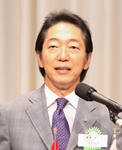Turbulent World Situation and Future of Japan
June 17, 2015
Mr. Seiichi Kanise
Journalist on International Affairs / News Anchor
Professor, School of Global Japanese Studies, Meiji University
�� ��Expenditure rises to meet income�� is the second law advocated by a British historian and political scientist C.N. Parkinson. People in need strive to get enough to eat. But as our income increases, we tend to spend on unnecessary things. The current dominance of credit cards symbolizes how easily our expenditure can exceed our income.
��Expenditure rises to meet income�� is the second law advocated by a British historian and political scientist C.N. Parkinson. People in need strive to get enough to eat. But as our income increases, we tend to spend on unnecessary things. The current dominance of credit cards symbolizes how easily our expenditure can exceed our income.
��There are limits on the amount of loans a household can get. The problem with governments is that there is no such limit for expenditures because government bonds can be issued to cover the shortage of financial resources. Expanding government debt is the most serious issue facing the world economy today.
��The bankruptcy of Lehman Brothers and the consequent financial turmoil of 2008 urged central banks to take monetary easing measures and fueled the low-interest economic bubbles. The real economy worth 70 trillion dollars has ballooned to over 200 trillion dollars, turning the world economy into gambling. Excessive rise in money supply has the risk of causing inflation that can lead to a loss of confidence in the currency.
��Now, the prolonged era of low interest rates world-wide is coming to an end and interest rates are beginning to rise. I am deeply concerned that Japan might fall behind the times and fail to redirect its economic policies. Our country has been bogged down in deflation and low-interest rates and we praise ourselves for high stock prices, while we turn a blind eye to our financial deficit that exceeds 1,000 trillion yen today. A forecast on world economy given by a prominent British economic journal stated ��US and India will be robust, China will slow down, Europe will stagnate, Brazil and Russia will decline and Japan will be in a dreamy state.�� Now, there��s nothing to be happy about because this is a British humor warning that we will sooner or later wake up to reality. Financial deficit keeps increasing while public and private assets keep decreasing in a country with a low birth rate and increasing longevity. The Japanese are like sunbathing on a deck of the sinking Titanic.
��We must face the reality and have a sense of crisis. We must also realize that an economy is not all about GDP growth. GDP simply measures gross sales generated by economic activities and it does not measure wealth or happiness. GDP growth itself does not make us happier. Let me give you an example. When two cars pass each other on a street, it makes little contribution to the GDP. But if the cars collide, you involve an ambulance, physicians, nurses, towing services, repairers, lawyers and insurance companies that all contribute to the GDP. I might sound extreme but solely from a GDP perspective, many accidents will push up the GDP. Needless to say, however, it doesn��t make us any happier.
��Let me point out the four problems we are facing in Japan today. Firstly, students don��t study enough. Secondly, politicians don��t work properly. Thirdly, salaried workers don��t work productively. And lastly, the elderly don��t pass away. I believe politics play a crucial role in making people feel a love for their own country. Japan was physically disarmed after WWII, but unfortunately, we were demoralized at the same time. An opinion poll result showed that only 7.7% of the Japanese youth responded that they would fight for Japan if a war broke out. The majority failed to commit themselves to protect their country. I think politicians have two missions to pursue, one is to set a vision for its people and the other is to achieve it. We once had remarkable politicians, including Prime Minister Hayato Ikeda who promised to achieve rapid economic growth in 10 years through his Income-Doubling Plan and achieved it in just 7 years.
��Japan became the first super-aged country in 2007, with more than 21% of our population being 65 or older and in 2013, the ratio reached 25% with 31.86 million people over 65 years old. There were 191 centenarians in 1964 when we hosted the Tokyo Olympics and today there are 54,000 and the number keeps growing. But these are not all bad news. We can turn adversity into opportunity. If Japan succeeds in overcoming various issues associated with aging population, we can be a good guide for other developed countries. We should take advantage of our high-quality social infrastructure, abundant human resources, advanced technology as well as financial resources.
��I think it is about time for the Japanese to stop imitating the Americans. Looking back on history, Japan once paid respect to industrial products manufactured in Germany, admired the French culture, introduced medical products from Switzerland and modeled our political system on the UK. We realize that we have taken a European style. When it comes to business management, however, we strive to adopt American standards like ROE or prioritizing efficiency. I think we should redirect our course. Martin Luther, a religious scholar of the Renaissance, once stated ��even if I knew that tomorrow the world would go to pieces, I would still plant my apple trees.�� Apples symbolize taboo or forbidden boundary for Christianity. To keep planting apple trees shows his determination to enlighten the younger generation by going beyond the forbidden boundaries and overcoming persecution. This is exactly what Japan should do now.